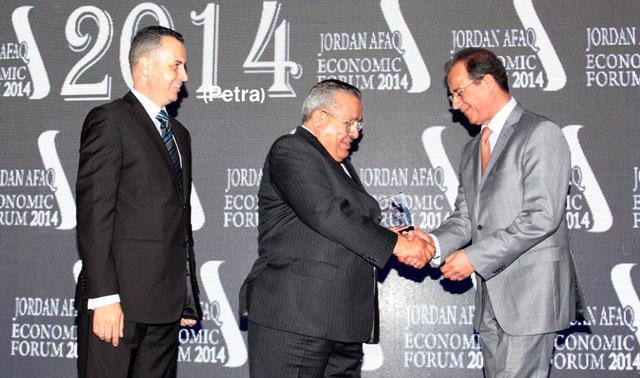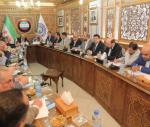You are here
Regional economies wither under Arab Spring — politicians and economists
By Omar Obeidat - Jun 03,2014 - Last updated at Jun 03,2014

AMMAN –– Politicians and economists on Tuesday blamed the "Arab Spring" for worsening economic problems in Arab countries.
At the 6th Jordan Afaq Economic Forum, experts said uprisings in several Arab states have negatively affected trade exchange between regional countries.
Senate President Abdur-Ra'uf S. Rawabdeh described trade between Arab states as "very modest", saying Arab economies depend on consumption more than production.
The status quo requires genuine political and economic partnerships between countries in the region, said Rawabdeh in his speech to inaugurate the two-day event titled "Arab Economies, Disputes and Crises".
"Things would have been much better if there was an integrated Arab economy," he added.
Economist Omar Razzaz, chairman of the King Abdullah II Fund for Development, called on decision makers in Arab countries to look into challenges hindering economic integration in the region, stressing the need to invest in innovation.
Most global fortunes grew due to investments in innovation and creativity and it is time for Arab states to build such investments, Razzaz said.
Amman Chamber of Commerce President Issa Murad said political instability in neighbouring countries such as Syria and Egypt have affected the Jordanian economy, adding that troubles in Libya forced many Jordanian professionals to return to Jordan, affecting the volumes of remittances.
Khaldoun Nusair, chairman of Afaq group which organised the event, said the Arab Spring has badly hit Arab economies, which were still struggling with the repercussions of the international financial crisis.
According to economist Mohammad Halaiqa, violence-hit Syria needs at least $150 billion to rebuild its economy.
Halaiqa said other countries in the region need no less than five years to exit political differences that had their toll on the economies.
On the impact of regional instability on Jordan, Halaiqa said the Syrian crisis and the influx of refugees put large pressure on the Kingdom's resources, which he noted are already limited.
He added that troubles in the northern neighbour hit trade between Jordan and Turkey, Lebanon and eastern Europe.
Trade exchange between Arab states declined over the past years by nearly 12 per cent due to instability, he remarked.
Participants also blamed the Arab Spring for the decline in investment and tourism inflows in Arab countries.
Related Articles
AMMAN — The "Arab Spring" does not show signs of slowing down and it is a "continuous process", according to a Jordanian economist.Although
Arab bankers on Wednesday blamed "Arab Spring" for the deterioration in the region's economies.
TUNIS — Tunisia's president on Monday proposed giving women equal inheritance rights despite protests from thousands of people objecting to

















